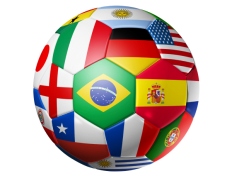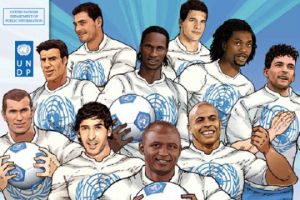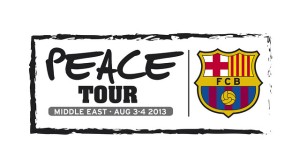Football diplomacy: A new form of soft power
“Sports personalities- especially footballers -are more important than politicians, because people look up to them.”
– Nelson Mandela.

Football is arguably the most popular sport on the planet. It is influential enough to bring the masses at a halt, and for the next 90 minutes, unite them with one universal language. Despite the many controversial moments in international football enraging supporters that resort to violence, football for the past century, has allowed to fizz out the line between nations. Many have praised international football for its encouragement of unity and peace. Former UN Secretary general Kofi Anan, acclaimed footballs potential to unite citizens from all across the world, despite being so often at odds. Football even went so far as to influencing the end of a 5-year civil war. As the Ivory Coast national team qualified for the world cup in 2005, the likes of Didier Drogba and his teammates dropped on their knees in front of news cameras begging both factions to lay down their weapons. It proved successful as the civil war ended a week later.
Nations and non-state actors have utilized the influence of football as a means of soft power, to fulfill their charitable, or even political objectives. Some, like Qatar, have also used football for commercial means to gain their status as an important global state –actor.
Since 2010, Qatar have delved into a number of investments that have given them, sponsorship rights with one of the worlds biggest football club – Barcelona, ownership of what is now one of the richest club, PSG, and securing the hosting of the 2022 world cup. Although marred with suspicion and controversy, Qatar has succeeded in gaining international prominence using football to bring to fruition their foreign policy objectives.
Brazil, under the current president, Dilma Rousseff emphasized that the ‘Investment in culture’ can supplement traditional diplomacy by promoting who they are to the world and what they have to offer. With that, Brazil is home to football, and with a successful international football record, the sport is an advantageous way exerting soft power to achieve their foreign policy goals. This also includes Brazil hosting the 2014 World Cup as well as other major sporting events including, the 2016 Olympic and Paralympic games in Rio De Janeiro.
The Match against poverty initiative under the United Nations Development Program (UNDP), have also used football to raise funds and awareness in order to prevent poverty and assist in natural disasters. Football legends have worked together with UNDP to host games against local teams across the world, allowing spectators to buy tickets whereby the proceeds go to charity. The likes of Zinedine Zidane, Ronaldo, and Didier Drogba have returned to the pitch allowing football fans see their renowned skills for a good cause. The tour included, Madrid, Marseille, Lisbon, Athens, Dusseldorf, and Porto Alegre, Brazil.
More ambitiously, FC Barcelona, one of the worlds biggest and most successful football club, embarked on a two day ‘peace tour’ between Israel and Palestine. The squad met locals and leaders in both Israel and the Palestinian Authority. Doing what they do best, the Barcelona squad also held football workshops and training sessions for children to engage in. As Barcelona is dearly admired by both sides of the Middle East debate, their tour was able to breakdown the differences between the two and for Barcelona to show the world football is a sport for all, regardless of the individual. Barcelona official, Sandro Rosell said that the team was a big believer in the power of sport to resolve differences. He also went on to say, “football is a universal language that should be used to bring people together.” (Israel national news, 2013).
Despite the negative aspects of international football, such as the comical Zinedine Zidane head butt on an Italian player in 2006, or more alarmingly the persistence of racial gestures, football has been a powerful tool for those who want to attract. Be it for commercial or political purposes, the coined term ‘football diplomacy’ has proven potent in achieving ones goals. The universality of football, puts all the worlds’ problems at pause, and allows all that are watching to speak one language. This is what is intriguing about football when implementing it in the realms of public diplomacy. It is not owned by one nation, and any country of any background can guarantee success when used as a diplomatic tool.
Sources:
- Miller, J. 2006. World Cup Diplomacy. [Online] Available at: http://uscpublicdiplomacy.org/index.php/newswire/cpdblog_detail/060827_world_cup_headbutt_diplomacy/
- Hayes, A. 2007. Didier Drogba brings peace to the Ivory Coast. [Online] Available at: http://www.telegraph.co.uk/sport/football/international/2318500/Didier-Drogba-brings-peace-to-the-Ivory-Coast.html
- Castro, A. 2013. 2014 World Cup and 2016 Olympic Games: Brazils strategy ‘to win hearts and minds’ through sports and football. [Online] Available at: http://publicdiplomacymagazine.com/wp-content/uploads/2013/02/2014-FIFA-World-Cup-And-2016-OlympIc-Games-BrazIl%E2%80%99s-Strategy-%E2%80%98to-Win-Hearts-and-Minds%E2%80%99-Through-Sports-and-Football.pdf
- Coruzzi, D. 2013. Qatar: Football as Soft Power. [Online] Available at: http://cpreview.org/2013/02/qatar-football-as-soft-power
- Lev, D, Ronen, G. 2013. Spanish Team Tries ‘Football Diplomacy’ to bring side together. [Online] Available at:http://www.israelnationalnews.com/News/News.aspx/170583#.Uz05eFt4akU
- Jaques, M. 2004. Footballs New World Order. [Online] Available at: http://www.theguardian.com/football/2004/jun/06/euro2004.sport6


Thank you for raising the issue of the place of sport in public diplomacy and world politics more generally. You make some interesting points, illustrated with some nice images. However, as I have commented before, I should have liked more effort to link the discussion to the key concepts of the module, primarily through engaging more closely with the academic literature. For instance, you might like to look at some of the articles in the recent special issue on sport and diplomacy in The Hague Journal of Diplomacy (Vol. 8, No. 3-4, 2013) and Simon Anholt’s reflections on sporting mega-events. You’ve included some really good examples in your piece, but what do they tell us about the nature of public diplomacy and soft power more generally?
There are a few typographical errors, such as commas where no pauses are required and missing apostrophes.
I agree that football, like other sports such as basketball, cricket, tennis and other sports have already played an important role restoring relations between nations in conflict, but nations also use sports in order to gain good foreign recognition and prestige. There is no doubt that football is a good connector in terms of public diplomacy and it is the king of sports.